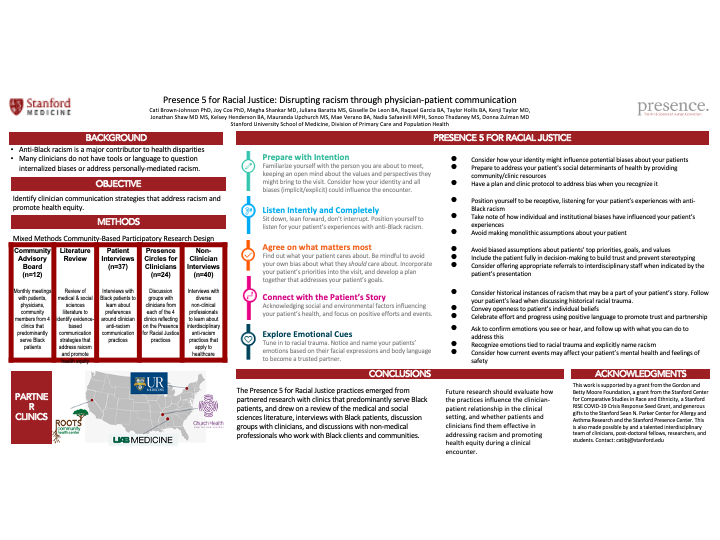PCR057: Presence for Racial Justice: Disrupting racism through physician-patient communication
Cati Brown-Johnson, PhD; Megha Shankar, MD; Juliana Baratta, MS; Gisselle De Leon, BS; Raquel Garcia, BA; Taylor Hollis; Jonathan Shaw, MD, MS; Mae-Richelle Verano; Kelsey Henderson; Mauranda Upchurch, MS; Sonoo Thadaney Israni, BA, MBA; Donna Zulman, MD, MS; Nicholas Kenji Taylor, MD, MSc; Nadia Safaeinili, MPH; Joy Cox
Abstract
Objective: Presence 5 for Racial Justice (P5RJ) leverages the Presence 5 patient-provider communication framework to identify anti-racism communication practices that support trusting relationships between physicians and Black patients and empower Black individuals in clinical care. Study design: For this multi-phased community-based participatory research (CBPR) overseen by an advisory board of clinicians and patients at four community clinics, we conducted a literature review, interviews with Black patients, clinician small-group discussions, and design thinking interviews with non-medical professionals. We mapped emergent communication practices to Presence 5 domains to create P5RJ.
Setting: Four primary care clinics primarily serving Black patients in Oakland CA; Rochester NY; Leeds AL; Memphis TN.
Population Studied: Total 113 participants (40 non-medical interviews, 37 Black patients interviewed, 12 advisory board members, 24 clinicians in discussion); 30 reviewed articles.
Outcomes: Strategies on how providers, through communication and connection in the clinical visit, can navigate and address structural, institutional, and personally mediated forms of racism faced by Black patients.
Results: P5RJ practices included: 1) Prepare with intention by reflecting on identity, bias, and power dynamics; and creating structures to address emergent bias and social determinants of health; 2) Listen intently and completely by using focused interpersonal listening without interruption and deep listening for racism impacts; give patients time and space to tell their story; 3) Agree on what matters most by having explicit conversations about patient goals, treatment comfort, consent, and referral planning; 4) Connect with the patient’s story by acknowledging socio-political factors influencing patient health and focusing on positive efforts/events to encourage patient agency; 5) Explore emotional cues by noticing and naming patient emotions and considering how racial trauma might influence these emotions.
Conclusion: P5RJ practices offer strategies to reflect on clinician biases, address racism and known gaps in care for Black patients and promote health equity in their clinical care.

Jack Westfall
jwestfall@aafp.org 11/20/2021thanks for your work and poster presentation.